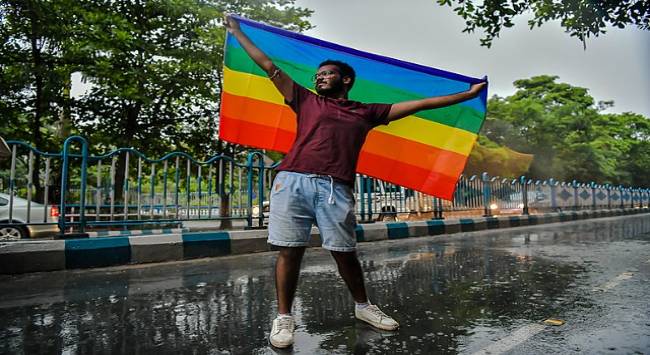Democratic Deficits and the Counter-Majoritarian Difficulty:
Ideologies, Institutions and the Same-Sex Marriage Debate
in India
Nachiket Midha, Imran Ahmed
26 June 2023Summary
The issue of legalising same-sex marriages in India involves two key problems. Firstly, there is a conflict between the legislature and the judiciary, with the legislature often rushing legislation without sufficient deliberation and scrutiny, and the judiciary having the power to overturn the decisions of elected majorities without democratic accountability. Secondly, if the legislature is granted authority, it would need to navigate a highly controversial interpretation of Hindu philosophy and thought within a secular framework to legislate on this matter.
The debate around the legalisation of same-sex marriage in India reached the Supreme Court (SC) in April 2023. A five-judge SC bench, headed by Chief Justice Chandrachud, presided over these hearings beginning 18 April 2023. The SC bench reserved its judgment on 11 May 2023, with possible indications of legalising same-sex marriage through a constitutional declaration under the Special Marriage Act of 1954. The Act allows marriages between individuals from different religious or caste backgrounds or nationalities to register their marriage in India. The Special Marriage Act’s vague phrasing regarding the formalisation of marriage between any two ‘persons’ gives the possible leeway to legalise same-sex marriage under this provision in India.
Opposition to the legalisation reached the SC via conservative organisations, including the Bharatiya Janata Party (BJP)-led central government in Delhi. This position relies on a specific reading of norms and values drawn from Hinduism and Hindutva (Hinduness) ideology and maintains that in Hindu law, the “object of dampatyā“ (conjugal) life is “procreation”, something which they argue does not apply to same-sex couples. The BJP and Hindu nationalist organisations, influenced by the views of Vinayak Savarkar, oppose same-sex marriage, citing traditional Hindu values. While the Rashtriya Swayamsevak Sangh, the chief organisation in the Sangh Parivar (a family of Hindu nationalist organisations), has shown some acceptance towards the lesbian, gay, bisexual, transgender and Queer (LGBTQ) community, it still hesitates to grant the latter marital rights based on the belief that marriage is a sacred institution to start a family according to Hindu philosophy. Hindu nationalists often cite treatises like Manusmriti and Arthashastra to establish their arguments against same-sex marriage. While neither text explicitly bans homosexual activities, in the case of sodomy, for instance, Arthashastra prescribes fines and Manusmriti mandates penance involving fasting and consumption of cow products.
Moreover, Hindu philosophy is not monolithic and prescribes numerous, contrasting moral philosophies, and some positions depict and mention homosexuality quite liberally. The Sun Temple and the Khajuraho Temple, for instance, have erotic depictions of homosexuality, often alongside Gods and Goddesses, and the treatise on sex, the Kamasutra, even normalises homosexual tendencies.
Furthermore, legal representatives of the conservative group argue that the ultimate decision regarding same-sex marriage should rest with the parliament, as it serves as a broader platform for public discussion and deliberation. However, granting such authority to the legislative body would effectively place the matter in the control of the Hindu-nationalist BJP-led parliament, which holds an absolute majority in the Lok Sabha (Lower House). Nevertheless, the previous actions of the current administration cannot be overlooked, as numerous bills have been enacted without sufficient consultation with the opposition parties, raising concerns about their track record. While this forebodes concerns of authoritarian-style majoritarianism, a judicial intervention on the issue also presents concerns about democratic deficits since the judiciary is both an unelected body and unaccountable directly to the people.
In the past, the judiciary in India (from the SC to the state high courts) has been, in most cases, surprisingly progressive in looking at same-sex marriage or union issues. As far back as 2011, in a one-off instance, the Punjab and Haryana High Court granted a lesbian couple legal recognition for marriage. Similarly, in the NALSA versus Union of India case, the SC recognised transgender as the official third gender and stressed the recognition of non-binaries in the whole gender debate in India. The Odisha and Uttarakhand High Courts ruled in 2020 that same-sex couples have equal rights in matters of live-in relationships as their heterosexual counterparts. Finally, and most importantly, the SC also decriminalised homosexuality in 2018 in the historic Navtej Johar versus Union of India case.
Various governmental and bureaucratic tasks require proof of family or marriage, excluding the LGBTQ community from equal provisions and rights enjoyed by heterosexual couples. This denial prevents them from legally forming families and accessing associated rights. Thus, the issue of same-sex marriage involves two core problems: the conflict between the legislature and judiciary, with the former’s questionable track record and the latter’s limited democratic accountability, and the potential controversy of legislating on the matter within a de jure secular framework based on a contentious interpretation of Hindu philosophy.
. . . . .
Mr Nachiket Midha is a research intern at the Institute of South Asian Studies (ISAS), an autonomous research institute in the National University of Singapore (NUS). He can be contacted at isav18@partner.nus.edu.sg. Dr Imran Ahmed is a Research Fellow at the same institute. He can be contacted at iahmed@nus.edu.sg. The authors bear full responsibility for the facts cited and opinions expressed in this paper.
Pic Credit: https://commons.wikimedia.org/wiki/File:Flaring_Freedom.jpg
-
 More From :
More From :
-
 Tags :
Tags :
-
 Download PDF
Download PDF


